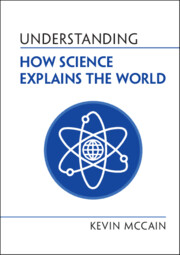Book contents
- Understanding How Science Explains the World
- Series page
- Understanding How Science Explains the World
- Copyright page
- Reviews
- Dedication
- Contents
- Foreword
- Preface
- Acknowledgments
- 1 Why Explanation Matters in Science
- 2 The General Nature of Explanation
- 3 Specific Kinds of Scientific Explanations
- 4 Explanation and Prediction
- 5 Evaluating Explanations
- 6 Explanatory Quality and Felt Understanding
- 7 False Theories, But Accurate Explanations?
- 8 From Explanation to Knowledge
- Concluding Remarks
- Summary of Common Misunderstandings
- References and Further Reading
- Figure Credits
- Index
1 - Why Explanation Matters in Science
Published online by Cambridge University Press: 17 June 2022
- Understanding How Science Explains the World
- Series page
- Understanding How Science Explains the World
- Copyright page
- Reviews
- Dedication
- Contents
- Foreword
- Preface
- Acknowledgments
- 1 Why Explanation Matters in Science
- 2 The General Nature of Explanation
- 3 Specific Kinds of Scientific Explanations
- 4 Explanation and Prediction
- 5 Evaluating Explanations
- 6 Explanatory Quality and Felt Understanding
- 7 False Theories, But Accurate Explanations?
- 8 From Explanation to Knowledge
- Concluding Remarks
- Summary of Common Misunderstandings
- References and Further Reading
- Figure Credits
- Index
Summary
While it isn’t necessary to do so, it’s often good to start a book by saying something that is clearly true. So, let’s do that. Science has had (and continues to have) a significant impact upon our lives. This fact is undeniable. Science has revealed to us how different species arise, the causes of our world’s changing climate, many of the microphysical particles that constitute all matter, among many other things. Science has made possible technology that has put computing power that was almost unimaginable a few decades ago literally in the palms of our hands. A common smartphone today has more computing power than the computers that NASA used to put astronauts on the Moon in 1969! There are, of course, many additional ways in which science has solved various problems and penetrated previously mysterious phenomena. A natural question to ask at this point is: why discuss this? While we all (or at least the vast majority of us!) appreciate science and what it has accomplished for modern society, there remain – especially among portions of the general public – confusions about science, how it works and what it aims to achieve. The primary goal of this book is to help address some specific confusions about one key aspect of science: how it explains the world.
Keywords
- Type
- Chapter
- Information
- Understanding How Science Explains the World , pp. 1 - 12Publisher: Cambridge University PressPrint publication year: 2022

